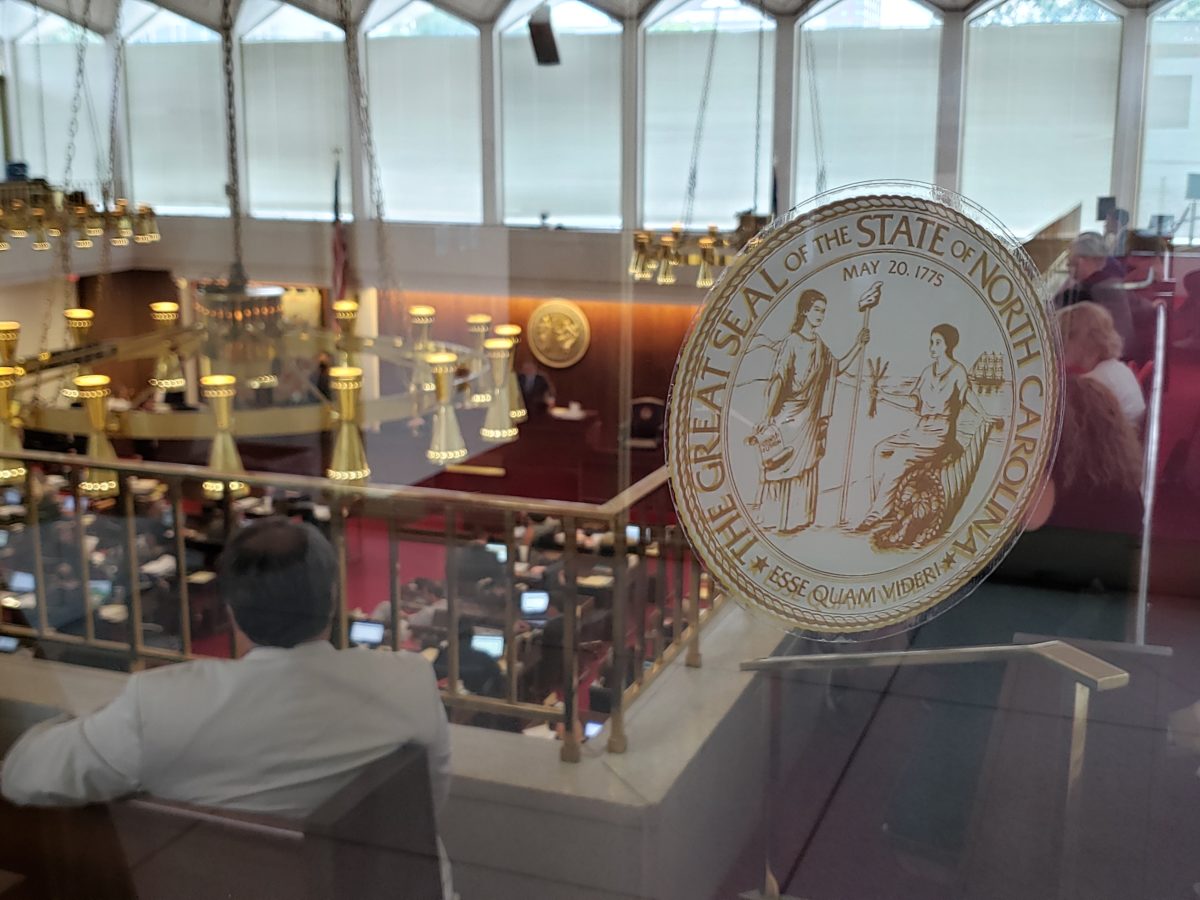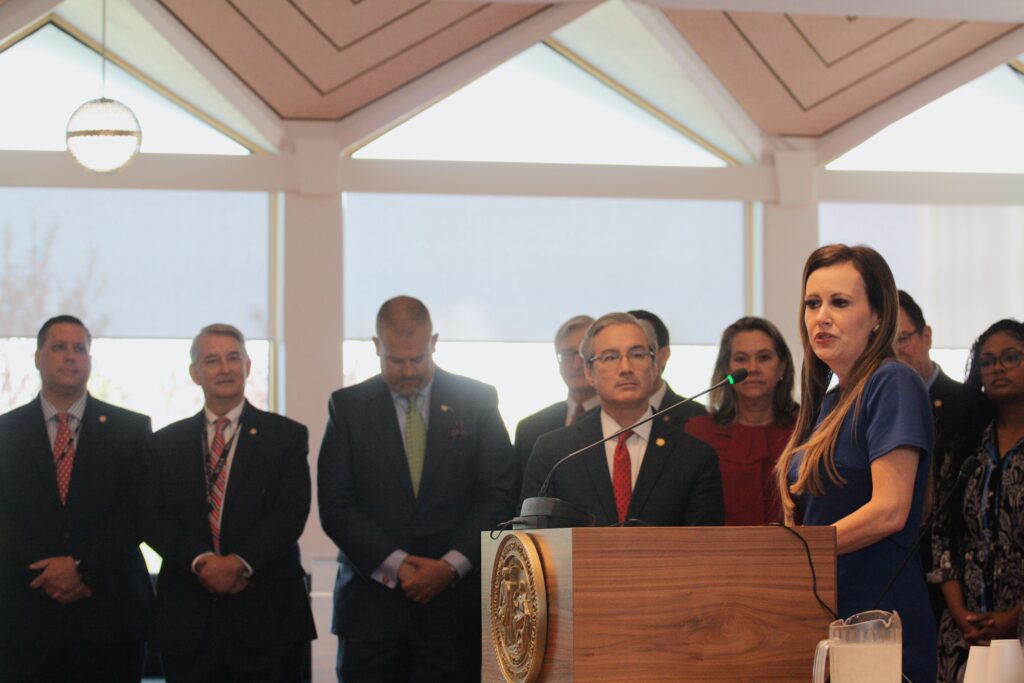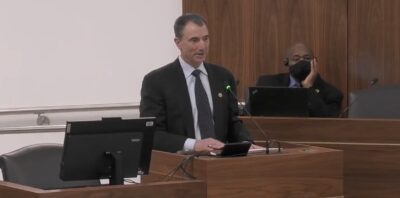

Share this story
- Under the bill, authority to approve, review, and deny charter schools would shift from the State Board of Education to the new review board. The State Board of Education would keep the power to make rules and appeal decisions by the new board.
- The committee also passed three bills creating school threat assessment teams, increasing penalties for sex offenses against students, and requiring transgender athletes to play on teams according to their “genetics at birth."
|
|
The Senate education committee on Wednesday moved forward a bill that would transfer authority from the State Board of Education to a new Charter School Review Board.
Republican sponsors say the bill will streamline the charter review process. Opponents of the bill – including members of the State Board of Education – say the bill is changing a process that already works well while also threatening accountability for charters.
The bill, House Bill 618, passed the House last month. It goes next to the Senate rules committee on Thursday at 9 a.m.
Under the bill, authority to approve, review, and deny charter schools would shift from the State Board of Education to the new review board. Currently, the State Board makes those final decisions, with consideration of recommendations from the Department of Public Instruction’s (DPI) Charter School Advisory Board (CSAB).
“This action will make the application process more efficient, more cost-effective, and much more streamlined for all stakeholders involved,” said Rep. Tricia Cotham, R-Mecklenburg, a primary sponsor of the bill.
Cotham announced her switch to the Republican party in April, giving the Republican party a supermajority in the General Assembly. Since then, she has been a sponsor of many bills expanding school choice.
The State Board of Education would remain the appellate body over charters, with the power to make rules and appeal any decisions made by the review board.
Membership of the proposed new review board would include:
- The state superintendent, as secretary of the review board. An amendment to the bill clarified that the superintendent would be a nonvoting member.
- Eight members appointed by the leaders of the House and the Senate.
- Two members appointed by the State Board of Education who are not current members of the Board and who are charter school advocates in North Carolina.
- The lieutenant governor or the lieutenant governor’s designee.


Context behind HB 618
The Republican-led legislature has introduced multiple bills this long session expanding school choice, through private schools and charters, which are public schools with more flexibility. As EdNC previously reported, while charter schools demonstrate the choice already available in the public school system, traditional public schools remain the top choice for most of the state’s students.
There are currently 206 charter schools in North Carolina, according to DPI’s recent annual report on charter schools. Amid continual and rising demand for charter schools, that report shows that charter schools and traditional public schools perform similarly, based on school performance grades and school growth.
Ahead of Wednesday’s committee meeting, State Board of Education Chair Eric Davis published a letter raising concerns about several of the bills, emphasizing the constitutional duties of the Board.
Davis requested HB 618 be reconsidered, arguing that the current “process clearly shows that quality charter school proposals, with the recommendation of CSAB and the background information provided by DPI’s Office of Charter Schools, are receiving a fair review.”
Of the more than 140 charter school applications that the CSAB recommended for approval since it began work in 2013, the SBE has approved over 90%. Moreover, as the only education body with the Constitutional responsibility for all public schools, charter and traditional, the SBE is uniquely positioned to weigh the issues for all NC students within charter requests.
State Board of Education Chair Eric Davis’s letter
State law currently gives the State Board of Education sole authority of charter school oversight in the state, including the approval and renewal of charters. The CSAB assists the State Board by providing recommendations. That advisory board is assisted by the Office of Charter Schools.
The Board has approved 26.26% of all charter school applications on average between 1997 to 2022. As mentioned above, Chair Davis said the board has approved 90% of applications recommended for approval by CSAB.
At Wednesday’s meeting, Sen. Gladys Robinson, D-Guilford, asked Cotham if she had read Davis’ letter. Robinson also pointed to the state constitution, which charges the State Board of Education with “supervising and administering the free public school system.”
“It is not just the rule-making appellate,” Robinson said of the State Board of Education. “It is actually the authority that approves and oversees education.”
Robinson said that the Charter School Advisory Board itself has some conflicts, in terms of who serves on the board and their relationship to charter schools.
Sen. Michael Lee, R-New Hanover, said he did not “disagree necessarily that sometimes we might want non-charter school operators” on such boards.
“There are charter schools that are doing a great job,” Robinson said. “It’s so very important that a fair review of the applications of schools themselves has a final authority under the State Board of Education.”
Others bills passed by the committee
The Senate education committee also discussed and passed three other bills.
School safety
First, the committee gave a favorable report to House Bill 605, which would establish “threat assessment teams” in public schools, along with peer-to-peer counseling, among other things. The bill must now go before the Senate rules committee.
The bill would also expand law enforcement access to all public school units and expand data collection requirements regarding school safety.
“All of us have been extremely focused on school safety for the last decade or so,” said, Rep. John Torbett, R-Gaston, the bill’s primary sponsor. “If applied appropriately, I firmly believe in my heart of hearts (the bill) could remedy, 30 years from now, a Vegas shooter like we had years ago, because we’ve addressed mental health at the earliest time period of a young individual.”
Lee made an amendment requiring local school boards to develop policies for assessment and intervention, not just the establishment of threat assessment teams. That amendment also added the requirement of a “referral to the appropriate local law enforcement agency if the individual is not a student.”
Lee’s amendment was passed and rolled into the bill, which received bipartisan support.
“We do not want North Carolina to face what we’ve seen in other states. So I thank you for moving forward with this,” Robinson said. “You’ve been doing this kind of work for a while, so thank you.”
Educator misconduct
Next, the committee discussed House Bill 142, which increases the penalties for sex offenses against students and taking indecent liberties with students to a Class G felony.
The bill was referred to the Senate committee on pensions and retirement and aging. It passed the House in March.
“I never thought I’d be here having to present a bill like this,” Torbett said.
State Superintendent Catherine Truitt, who requested the bill, previously told the judiciary committee that the state revokes about 20 teacher licenses per year for a variety of sexual misconduct offenses in schools.
HB 142 would further require administrators to report terminations or resignations to the State Board of Education within five days, with failure to do so as a Class I felony. Another part of the bill includes development of an informational video for students in grades 6-12 to teach them about sexual misconduct, beginning in the 2024-25 school year.
“I know some school administrators are deeply concerned about the increase in penalty, but if you simply follow the law, you have absolutely nothing to worry about,” Torbett said. “I would also like to let you know that this in no way depicts all teachers throughout North Carolina. This is only some very bad actors that are currently in the profession, who for whatever reason, have chosen an evil path.”
“I want to make sure that we fully understand that any attempt to portray all teachers would be extremely inaccurate and very, very unfair,” he added.
Robinson also expressed support of the bill. Sen. Bobby Hanig, R-Bertie, asked how the bill sponsors landed on a Class G Felony, which typically carries a 10-25 month jail sentence, according to General Assembly staff.
Hanig asked why the charge wasn’t higher.
“The goal was to simply strengthen the penalty from what it had been in order to hopefully deter the actions,” Truitt said on Wednesday. “But also to ensure that those in leadership positions in schools do not sweep these events under the rug.”
Transgender student athletes
Finally, the committee discussed House Bill 574. The controversial bill, which would require transgender athletes at the middle, high school, and collegiate levels to play on teams assigned by their “reproductive biology and genetics at birth,” has amassed a lot of attention from the public since it was introduced.
On Wednesday, the room was full of members of the public. Sen. Galey said at the start of the meeting there would likely be another time to make public comment in rules if the bill passed.
The committee began discussing the bill around 11:40 and ended the committee meeting sharply at 12:00. With 10 minutes left in the meeting, four people spoke about the bill, with one person speaking in opposition to it. Many people who signed up to speak were not able to.
No more than 15 transgender athletes have been approved to play high school sports this year in North Carolina, the Associated Press reported, and only two are transgender girls.
“I think we have a system now that does go on a case-by-case basis to determine what team is appropriate,” said Sen. Natasha Marcus, D-Mecklenburg. “I think that system is much better than this bright line rule that seems to ignore the fact that transgender people exist and that all students have a right to play sports.”
The Senate already passed a companion version of the bill, Senate Bill 631, in April.
On Wednesday, Sen. Kevin Corbin, R-Cherokee, made an amendment to “correct the differences” between the two bills.
That amendment removed from HB 574 restrictions on females from competing on male sports teams, naming girls who play as kickers on football teams as an example.
The amendment also removed the application of HB 574 to intramural sports at collegiate level. The bill still applies to non-intramural sports teams at the collegiate level, including public, private, and community colleges.
The amended bill must now go before the rules committee.





